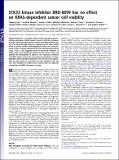| dc.contributor.author | Luo, Tuoping | |
| dc.contributor.author | Masson, Kristina | |
| dc.contributor.author | Jaffe, Jacob D. | |
| dc.contributor.author | Silkworth, Whitney | |
| dc.contributor.author | Lee, Nathan Ross | |
| dc.contributor.author | Scherer, Christina A. | |
| dc.contributor.author | Scholl, Claudia | |
| dc.contributor.author | Frohling, Stefan | |
| dc.contributor.author | Stern, Andrew M. | |
| dc.contributor.author | Schreiber, Stuart L. | |
| dc.contributor.author | Golub, Todd R. | |
| dc.contributor.author | Carr, Steven A | |
| dc.date.accessioned | 2012-09-07T14:41:27Z | |
| dc.date.available | 2012-09-07T14:41:27Z | |
| dc.date.issued | 2012-02 | |
| dc.date.submitted | 2011-09 | |
| dc.identifier.issn | 0027-8424 | |
| dc.identifier.issn | 1091-6490 | |
| dc.identifier.uri | http://hdl.handle.net/1721.1/72564 | |
| dc.description.abstract | Approximately 30% of human cancers harbor oncogenic gain-of-function mutations in KRAS. Despite interest in KRAS as a therapeutic target, direct blockade of KRAS function with small molecules has yet to be demonstrated. Based on experiments that lower mRNA levels of protein kinases, KRAS-dependent cancer cells were proposed to have a unique requirement for the serine/threonine kinase STK33. Thus, it was suggested that small-molecule inhibitors of STK33 might have therapeutic benefit in these cancers. Here, we describe the development of selective, low nanomolar inhibitors of STK33’s kinase activity. The most potent and selective of these, BRD8899, failed to kill KRAS-dependent cells. While several explanations for this result exist, our data are most consistent with the view that inhibition of STK33’s kinase activity does not represent a promising anti-KRAS therapeutic strategy. | en_US |
| dc.description.sponsorship | National Institutes of Health (U.S.) Genomics Based Drug Discovery-Driving Medical Project (Grant number RL1-GM084437) | en_US |
| dc.description.sponsorship | National Institutes of Health (U.S.) Genomics Based Drug Discovery-Driving Medical Project (Grant number RL1-CA133834) | en_US |
| dc.language.iso | en_US | |
| dc.publisher | National Academy of Sciences | en_US |
| dc.relation.isversionof | http://dx.doi.org/10.1073/pnas.1120589109 | en_US |
| dc.rights | Article is made available in accordance with the publisher's policy and may be subject to US copyright law. Please refer to the publisher's site for terms of use. | en_US |
| dc.source | PNAS | en_US |
| dc.title | STK33 kinase inhibitor BRD-8899 has no effect on KRAS-dependent cancer cell viability | en_US |
| dc.type | Article | en_US |
| dc.identifier.citation | Luo, T. et al. “STK33 Kinase Inhibitor BRD-8899 Has No Effect on KRAS-dependent Cancer Cell Viability.” Proceedings of the National Academy of Sciences 109.8 (2012): 2860–2865. Copyright ©2012 by the National Academy of Sciences | en_US |
| dc.contributor.department | Massachusetts Institute of Technology. Engineering Systems Division | en_US |
| dc.contributor.department | Koch Institute for Integrative Cancer Research at MIT | en_US |
| dc.contributor.approver | Carr, Steven A. | |
| dc.contributor.mitauthor | Lee, Nathan Ross | |
| dc.contributor.mitauthor | Carr, Steven A. | |
| dc.relation.journal | Proceedings of the National Academy of Sciences | en_US |
| dc.eprint.version | Final published version | en_US |
| dc.type.uri | http://purl.org/eprint/type/JournalArticle | en_US |
| eprint.status | http://purl.org/eprint/status/PeerReviewed | en_US |
| dspace.orderedauthors | Luo, T.; Masson, K.; Jaffe, J. D.; Silkworth, W.; Ross, N. T.; Scherer, C. A.; Scholl, C.; Frohling, S.; Carr, S. A.; Stern, A. M.; Schreiber, S. L.; Golub, T. R. | en |
| dc.identifier.orcid | https://orcid.org/0000-0002-7203-4299 | |
| mit.license | PUBLISHER_POLICY | en_US |
| mit.metadata.status | Complete | |
